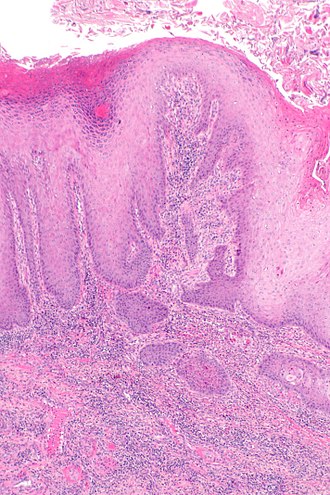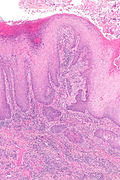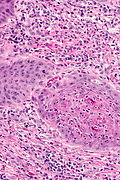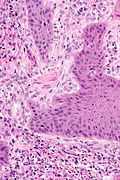Difference between revisions of "Squamous cell carcinoma of the penis"
Jump to navigation
Jump to search
| Line 1: | Line 1: | ||
{{ Infobox diagnosis | {{ Infobox diagnosis | ||
| Name = {{PAGENAME}} | | Name = {{PAGENAME}} | ||
| Image = | | Image = Squamous carcinoma of the penis -- low mag.jpg | ||
| Width = | | Width = | ||
| Caption = | | Caption = Squamous carcinoma of the penis. [[H&E stain]]. | ||
| Synonyms = | | Synonyms = | ||
| Micro = | | Micro = | ||
| Subtypes = | | Subtypes = | ||
| LMDDx = | | LMDDx = squamous dysplasia, [[pseudoepitheliomatous hyperplasia]] | ||
| Stains = | | Stains = | ||
| IHC = | | IHC = | ||
| Line 56: | Line 56: | ||
DDx: | DDx: | ||
*Squamous dysplasia. | *Squamous dysplasia. | ||
*[[Pseudoepitheliomatous hyperplasia]]. | |||
===Staging=== | ===Staging=== | ||
| Line 64: | Line 65: | ||
*pT3 - urethral involvement. | *pT3 - urethral involvement. | ||
*pT4 - adjacent structure(s) involved. | *pT4 - adjacent structure(s) involved. | ||
==Images== | |||
<gallery> | |||
Image: Squamous carcinoma of the penis -- low mag.jpg | Penile SCC - low mag. | |||
Image: Squamous carcinoma of the penis -- high mag.jpg | Penile SCC - high mag. | |||
Image: Squamous carcinoma of the penis - alt -- high mag.jpg | Penile SCC - high mag. | |||
Image: Squamous carcinoma of the penis - 2 -- intermed mag.jpg | Penile SCC - intermed. mag. | |||
Image: Squamous carcinoma of the penis - 2 -- high mag.jpg | Penile SCC - high mag. | |||
</gallery> | |||
==Sign out== | ==Sign out== | ||
Revision as of 20:49, 4 July 2014
| Squamous cell carcinoma of the penis | |
|---|---|
| Diagnosis in short | |
 Squamous carcinoma of the penis. H&E stain. | |
| LM DDx | squamous dysplasia, pseudoepitheliomatous hyperplasia |
| Gross | mass lesion, scaly patches/nodules, usu. erythematous, +/-ulceration. |
| Site | penis |
|
| |
| Clinical history | uncircumcised |
| Prevalence | uncommon overall, most common form of penis cancer |
| Prognosis | good |
| Treatment | surgery |
Squamous cell carcinoma of the penis is the most common malignancy of the penis.
General
- Not very common overall.[1]
- Most common form of penis cancer.
- Non-squamous penis cancer only ~5% of cases.[2]
Epidemiology:[1]
- Median age ~ 67 years old.
- Usually a good outcome - 5 year cause specific survival ~ 81%.[1]
Gross
- Scaly patches/nodules.
- Usu. erythematous.
- +/-Ulceration.
Microscopic
Features:
Notes:
- Usually grade 2.[1]
- Lymphovascular invasion - prognostically important,[3] and changes the T-stage for pT1a tumours to pT1b.
DDx:
- Squamous dysplasia.
- Pseudoepitheliomatous hyperplasia.
Staging
T-stage:
- pT1a - subepithelial tissue involved, no LVI, not poorly differentiated (G3 or G4).
- pT1b - subepithelial tissue involved with LVI or poorly differentiated.
- pT2 - corpus spongiosum or cavernosum involved.
- pT3 - urethral involvement.
- pT4 - adjacent structure(s) involved.
Images
Sign out
TIP OF PENIS, PARTIAL PENECTOMY: - INVASIVE SQUAMOUS CELL CARCINOMA, MODERATELY DIFFERENTIATED. -- SURGICAL MARGINS NEGATIVE FOR DYSPLASIA AND NEGATIVE FOR MALIGNANCY. -- PLEASE SEE TUMOUR SUMMARY.
TIP OF PENIS, PARTIAL PENECTOMY: - INVASIVE SQUAMOUS CELL CARCINOMA OF CORONAL SULCUS, MODERATELY DIFFERENTIATED. -- SURGICAL MARGINS NEGATIVE FOR DYSPLASIA AND NEGATIVE FOR MALIGNANCY. - LICHEN SCLEROSIS. - POST-SURGICAL CHANGES (GRANULOMATOUS INFLAMMATION (NON-NECROTIZING), SIDEROPHAGES). COMMENT: This lesion was previously excised. The surgical clearance is 1 mm. The tumour thickness is approximately 4 mm. No lymphovascular invasion is identified. No lymphovascular invasion is identified. No corpus spongiosum or corpus cavernosum invasion is seen. The staging is unchanged.
See also
References
- ↑ 1.0 1.1 1.2 1.3 Burt, LM.; Shrieve, DC.; Tward, JD. (Jan 2014). "Stage presentation, care patterns, and treatment outcomes for squamous cell carcinoma of the penis.". Int J Radiat Oncol Biol Phys 88 (1): 94-100. doi:10.1016/j.ijrobp.2013.08.013. PMID 24119832.
- ↑ Moses, KA.; Sfakianos, JP.; Winer, A.; Bernstein, M.; Russo, P.; Dalbagni, G. (Dec 2013). "Non-squamous cell carcinoma of the penis: single-center, 15-year experience.". World J Urol. doi:10.1007/s00345-013-1216-y. PMID 24292119.
- ↑ Bhagat, SK.; Gopalakrishnan, G.; Kekre, NS.; Chacko, NK.; Kumar, S.; Manipadam, MT.; Samuel, P. (Feb 2010). "Factors predicting inguinal node metastasis in squamous cell cancer of penis.". World J Urol 28 (1): 93-8. doi:10.1007/s00345-009-0421-1. PMID 19488760.




